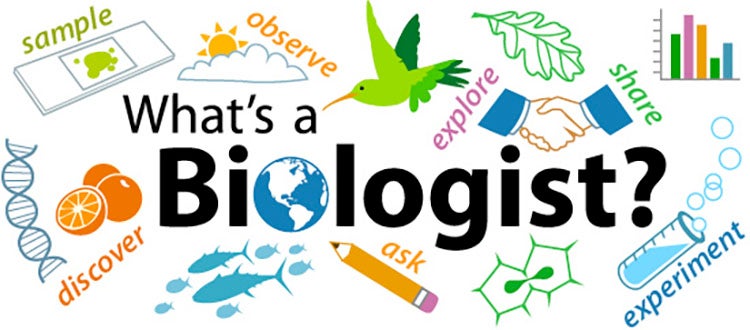
Illustrated by: Sabine Deviche
Life as a Biologist
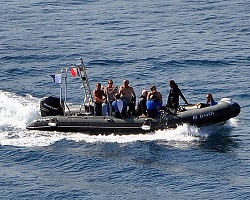
The midday sun is high in the sky as the diver adjusts her facemask and opens her tank valve. When she is ready, she gets the thumbs up from another member from the research team and together they plunge into the water.
The boat rocks gently on the surface as they dive below. Not far from the surface, one of the divers begins to move along the large coral reef that grows on the shallow ocean floor.
A few months earlier the research team had placed markers along the reef to measure its growth. Today they returned to check its progress. A small camera on the lead researcher's diving suit records her exploration of the ocean bottom. The diver collects samples from a few areas on the coral reefs that don’t seem to be growing as well as the others.
Biologists Work Together
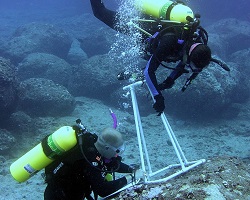
At the same time, another diver collects a few other samples in the area, including water and plants. The remaining members of the research team stay on the boat to keep an eye on things above the water.
After getting their samples, the divers return to the surface and climb on to the boat. The engine revs up as they move to their next site to repeat the process. After collecting samples from each of their field sites, the boat moves slowly toward the dock. The research group brings the samples back to their lab, ready to begin analyzing what they have collected. Their wet suits are replaced by white lab coats, and they begin working through the different samples.
Now is the time for each of the 5 members of the research team to begin to use her or his unique lab skills. They each examine the specific samples they collected under the water. This is because each member has special training to inspect those samples.
Despite the special job that each member of the research team has, they all have one thing in common. They are all biologists.
Biology is the Study of Life and Living Things
(Bio = life | ology = the study of)
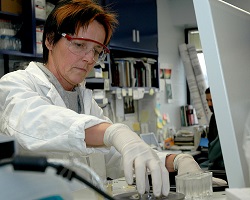
A biologist is a scientist who studies living organisms. Studying life can mean many different things and be very complex. Biology research can focus on how an organism came to exist, how it is built, how it grows, how it functions, what it does, or where it lives. With so many living things to study and places and ways to study them, it is very difficult to be an expert in the huge field of biology.
Because of this, biologists will often specialize in a particular field. This means that she or he will select one very specific feature about a living thing or group of living things, and study this area in great detail. The best part is that most biologists are able to choose what they study. For the diving team, this means that each member of the team is studying what interests her or him most.
The first member of the research team, an ecologist, works on the coral reef samples the team collected. She is interested in why the coral reef has slower growth in some areas. As an ecologist, she will study the interactions of organisms within the coral reef.
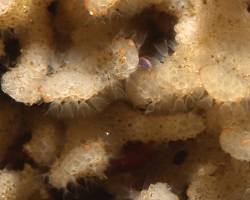
An aquatic biologist, who studies organisms that live in water, begins to test the water samples. He might look at the water samples to see what types of organisms are living in the areas around the coral reef where the team’s samples were taken.
The plant samples are studied by a botanist, a type of biologist that studies plants and their environments. She helps the research team understand what types of plants are growing around the coral reef, and how growth might change between each place where they collected their samples.
The research team believes there could be differences in their samples in each place they were collected. A biogeographer enters the data from each location into a large map on the computer. His job is to study different areas, close or far apart, and the different types of living things in each one. He looks to see how the organisms in each area are similar or different, and why.
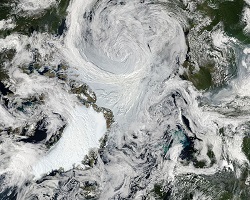
Finally, a bioclimatologist looks at the weather measurements from above the seawater where the samples were taken. A bioclimatologist studies how climate affects living things. The weather in each area where they collected their data could affect how the coral reef grows.
Want to learn the real story behind the problems we are seeing in coral reefs? Check out our podcast, Mystery of the Dying Coral Reefs.
Or download it here.
Of course, there are many other types of biologists. If you take a moment to think about your favorite living thing, there is probably a field of biology to study it. Each biologist has a special job, just like each animal, plant, or other organism they find has an important job in the ecosystem being studied.
While a research group may focus on one particular living thing within an ecosystem, understanding the other parts of the ecosystem are just as important. Biologists work together to look at the big picture of how living things survive on their own, and how they work together in a larger system.
Additional images via Wikimedia Commons. Image of child with bathyscope via US Fish and Wildlife Service Southeast Region.
Bibliographic details:
- Article: What's a Biologist?
- Author(s): Patrick McGurrin
- Publisher: Arizona State University School of Life Sciences Ask A Biologist
- Site name: ASU - Ask A Biologist
- Date published:
- Date accessed:
- Link: https://askabiologist.asu.edu/explore/whats-biologist
APA Style
Patrick McGurrin. (). What's a Biologist?. ASU - Ask A Biologist. Retrieved from https://askabiologist.asu.edu/explore/whats-biologist
Chicago Manual of Style
Patrick McGurrin. "What's a Biologist?". ASU - Ask A Biologist. . https://askabiologist.asu.edu/explore/whats-biologist
Patrick McGurrin. "What's a Biologist?". ASU - Ask A Biologist. . ASU - Ask A Biologist, Web. https://askabiologist.asu.edu/explore/whats-biologist
MLA 2017 Style

It's never too early or too late to pursue your interest in biology. This young biologist is using a bathyscope to see underwater.
Be Part of
Ask A Biologist
By volunteering, or simply sending us feedback on the site. Scientists, teachers, writers, illustrators, and translators are all important to the program. If you are interested in helping with the website we have a Volunteers page to get the process started.

